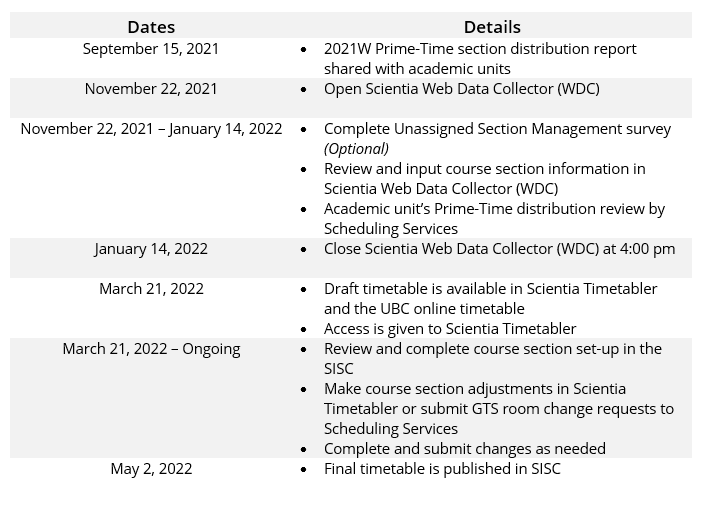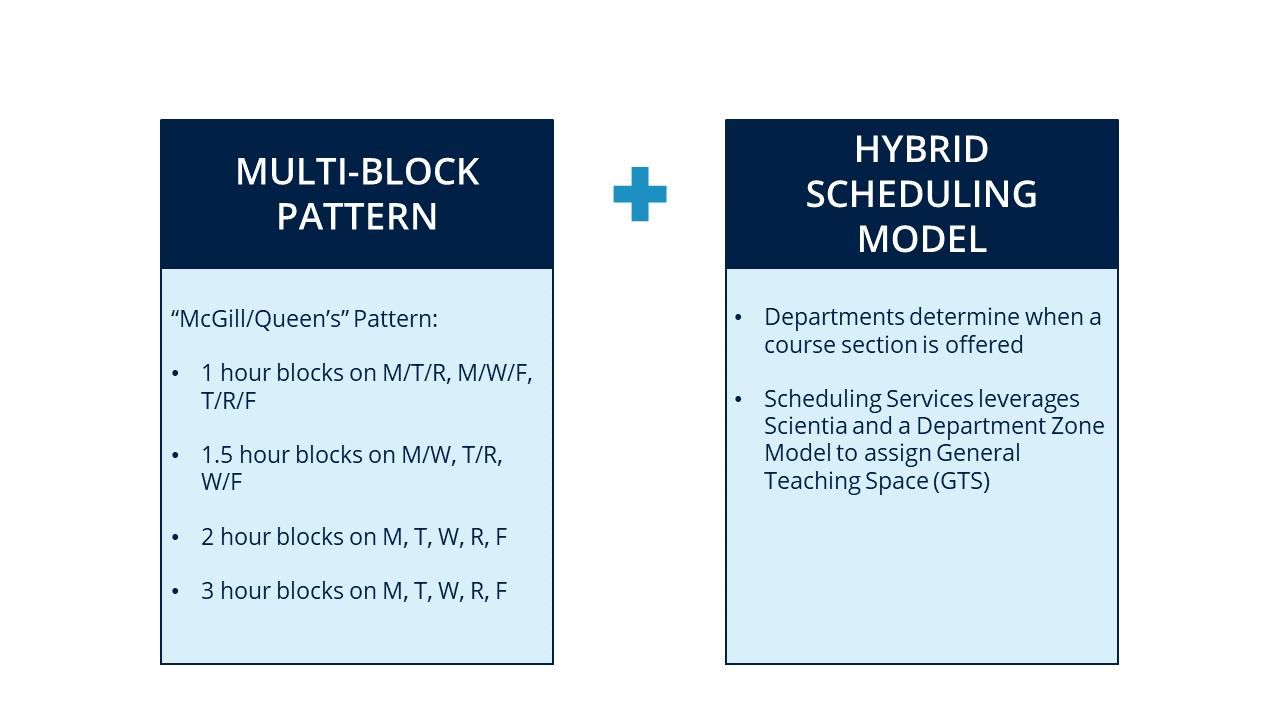This is a legacy page. For current information about course scheduling at UBC please visit the Course Scheduling wepage.
Visit this page often for updates about the scheduling project, upcoming community consultations and other project news.
Project Update: Resources for 2022W Academic Course Scheduling
To support academic units in the planning of the 2022W schedule, the Vancouver Scheduling Project website has been updated with a number of documents including the 2022W course scheduling timelines and Academic Course Scheduling Operational Procedures. These documents have been created in consultation with our T-rep Advisory Committee, stakeholders and project governance. The following documents and others can be found on the resource page of our website.
2022W Course Scheduling Timeline:

Academic Course Scheduling Operational Procedures (.xlsx):
- This document should be used as a resource when planning for the 2022W scheduling cycle and will replace the current Course Scheduling Guidelines for 2022W.
Next Steps:
- In early fall, a Canvas course and course scheduling manuals will be available to support T-Reps. This will include resources for the new Scientia tool, Web Data Collector (WDC) and updated business processes. Drop-in sessions will also be offered in the fall for troubleshooting and additional support.
- A communication resource for faculty will be coming soon to help academic units share key information about the Vancouver Scheduling Project to teaching faculty.
- Course section distribution reports will be shared with academic units in September. These reports will show the percentage of 2021W course sections in GTS, per course code, that are scheduled in Prime-Time (10 am -1:59 pm).
Please reach out to scheduling.projects@ubc.ca if you have any questions.
Phase 2 Project Update: Approval and Next Steps
As our sponsors recently announced (PDF), the Vancouver Scheduling Project has received approval to move forward with Phase 2 of the project, which includes the implementation of a hybrid model and multi-block pattern for the 2022W schedule.
In Phase 2, Implementation, there will be some changes to the project leadership and governance. We are welcoming Robbie Morrison to the role of Project Lead, as he steps in as Associate Registrar and Director, Scheduling, Records and Systems Management in Enrolment Services. Annie Yim, Acting Deputy Registrar and Director, Human Resources, will transition onto the Sponsor’s Committee in place of Kate Ross, Associate Vice-President, Enrolment Services and Registrar.
In response to your feedback
Engagement with the UBCV scheduling community is key to the continued success of the project. In response to the feedback received from the community on the project’s proposed scheduling solutions, adjustments have been made to some of the recommendations as follows:
There will be no change to teaching start time, it will remain at 8:00 am
- TransLink is concerned that shifting the start time to 8:30 am will cause misalignment with peak transit times across the region
- There needs to be more investigation done on the impact of this change on faculty availability
- More investigation is required on the repercussions of a later end time on students (i.e. impact on evening commitments)
- Many programs have pedagogical reasons for starting at 8:00 am
Core and elective courses will be prioritized equally for room assignments
- Room assignments will be prioritized by planned size only, which will ensure that all courses on campus are allocated space more equitably
- Removing this additional constraint will streamline the room assignment process.
A M/F block option will be added to the multi-block pattern
- This will provide additional opportunities to create more equal distribution of courses scheduled across the week
Next Steps

During the November community sessions, the community expressed a desire for a tool to visualize and create timetables. In response, we have identified an opportunity to partner with Applied Science in the search of a tool, with the hope of finding a solution that can be utilized across the university. The new tool will help the entire UBC scheduling community to plan and create a pre- schedule (days and times only) prior to submission into Scientia. The community also requested support to manage the increased potential for creating course conflicts within the multi-block pattern. We know that the scheduling community already works together to manage course conflicts and we are exploring ways to further support the work that is being done.
In the next few weeks we will send out a short Qualtrics survey to our scheduling partners, this will give departments the opportunity to adjust centroids for their course codes, if needed. The current centroid for each course code can be viewed using the Updated Dept Zones - Phase 2 (XLSX) found here.
We are also working on developing new scheduling policies, business processes and timelines so that we can share these with you in the Spring when we provide our next project update.
Phase 1 Recommendations: Scheduling Model and Pattern - December 2020
As we head into December, the UBC Vancouver Scheduling Project is nearing the key milestone of completing project Phase 1. After conducting scheduling simulations and analyzing the results throughout the summer, the project has developed recommendations which include a new multi-block pattern and hybrid scheduling model. Since October, 2020 we have engaged scheduling stakeholders across the Vancouver campus to share our recommendations and to gather feedback.
With a multi-block pattern, classes can be scheduled in 1, 1.5, 2, or 3 hour blocks with different combination of days in the week. This pattern provides for increased flexibility to support current and future pedagogical innovation and needs. Given that our current pattern fits within this multi-block pattern, departments can choose to continue to run their schedule the way it currently is, and/or choose to leverage the new pattern for courses.
Adoption of a hybrid scheduling model will have departments continue to retain agency in determining what course sections to offer and when (i.e. departments continue to determine the dates/times for their course sections). The key difference with this model is that Scheduling Services will take on a coordinated role of allocating classrooms to the course sections that have been scheduled. To do this, Scheduling Services will use room requirements provided by departments; and leverage Scientia and a new Departmental Room Zone Allocation model.

Thank you to those who were able to attend one of the November 24-27 scheduling community recommendation sessions. We heard many great questions and comments regarding multi-block pattern and hybrid model. We have shared them with our project governance and on the website in the Project Resources under FAQs.
The work does not end here. In Phase 2 of the project we will continue engagement with the scheduling community to fine tune our recommendations to ensure effective implementation. The feedback we have received will guide us in our work. Some of this work includes:
- Refining/developing business processes, timelines and documentation
- Adjust Room Zone Allocation Model (e.g. working with departments to adjust their centroids for each course code they oversee)
- Update scheduling guidelines to policy
- Develop room change request process (i.e. criteria and governance)
- Course conflict mitigation support for depts.
- System and process training for T-Reps and scheduling stakeholders
- Scientia production environment set up
We hope to have the scheduling recommendations (e.g. multi-block pattern and hybrid scheduling model) approved by our project governance later this month and we will share updates about the decisions made and next steps by the end of January 2021.
For more information, please see the Project Resources page.
Simulation & Evaluation - June 2020
As a result of Covid-19, the past few months have challenged every aspect of work here at UBC. This includes the work required of faculties and departments to adjust the academic course schedule in response to our changing circumstances. We would like to acknowledge the effort and adaptability of the academic course scheduling community; and in particular for the community’s continued engagement and support for the project during this challenging time.
With your continued support and engagement, in late April we were able to wrap up the last of 49 follow-up sessions with departments. In efforts to gain student perspective, we have also completed a surveyed of undergraduate and graduate students on the Vancouver campus. We surveyed students on scheduling topics such as travel time between classes, class start time, class duration, and course conflicts. We received over 4000 completed student surveys, resulting in an 8% completion rate.

With all the inputs received from the scheduling community (i.e. Web Data Collector inputs, departmental and student survey results, and follow up meeting information) the project team has been able to effectively analyze the scheduling requirements provided; and is now positioned to move into the Simulation and Evaluation phase of our project.
Project Next Steps: Simulation & Evaluation
Two community informed simulations will be conducted over the summer using a Hybrid Model and a Coordinated Model.
- Hybrid Model: Academic units determine course dates and times, while Scheduling Services allocates general teaching space.
- The Hybrid Model simulation will be conducted twice: First, allocation of general teaching space will be based on 2019W classroom inventory, and then it will be based on future-state classroom inventory.
- Coordinated Model: Academic units provide scheduling requirements, constraints and considerations, while Scheduling Services leverages Scientia to produce the academic course schedule.
Developed in partnership with Sauder Centre for Operational Excellence (COE), an evaluation framework, consisting of KPIs and metrics that map to project goals and objectives, will be used for each simulation.
In early fall simulation results will be shared and the scheduling community will be asked to consider and provide feedback for the proposed models and patterns in terms of feasibility and overall benefits for UBC Vancouver.
Approval of the new scheduling model and pattern is anticipated for early December with further opportunity for the community to contribute considerations during Implementation (Phase 2).
We will be in touch in September to share more information about the simulations and future engagement opportunities.
Download the updated Project Bulletin (June 2020)
Community Consultations - December 2019

Community consultation and engagement is integral to ensuring the gathering of quality scheduling inputs with a pedagogical focus. These inputs will enable the team to conduct productive simulations and evaluations of various scheduling options.
To test the data collection tool, WDC, we worked with a testing group of T-Reps. In August, we engaged with a pilot group of Departments to help trial and gain some lessons learned on the scheduling inputs collection process and approach. The pilot group inputs collection and consultation wrapped up in early November, and we have now begun our engagement with the rest of the UBC Vancouver scheduling community. The community engagment extends through April 2020.